

Origin of Terms Denoting the 'Bible'
Christians/messianics have been known throughout the centuries as the 'People of the Book'. The 'Scriptures', 'Bible', 'Scrolls', 'Codices/Codexes' or 'Books', as they have been generally known through the centuries, are central to the Christian/Messianic faith. Christianity is not only a spiritual and practical religion but is firmly rooted in the stream of time: its central events are historical and therefore verifiable. The Bible is a book of revelation and is the source as well as the result of inspiration. The utterances of the men of old, at the suggestion or under the guidance of the Ruach haQodesh (Holy Spirit), live and move again in each generation, with informing, uplifting, redeeming power, under the blessing of the same Ruach (Spirit), in the hearts and lives of men and women. Every detail regarding it is therefore interesting and worth careful study.
Scripture's Nature, Expositors and Legacy
The searching of the Scriptures is commended for the purpose of revering Yahweh - their words are to be carefully followed (Dt.17:19). They are to be spoken out loud, meditated on day and night (Ps.119:148) and carefully observed (Josh.1:8). In studying them diligently a man will learn how to obtain eternal life (Jn.5:39). The Scriptures cannot be broken because they are authoritative and reliable (Jn.10:35), being given by inspiration from Elohim (God) (2 Tim.3:16; Heb.1:1; 3:7; 10:15; 2 Pet.1:20-21) through nevi'im (prophets) (Lk.16:31;Rom.3:2; Heb.1:1). They were fulfilled in Christ (Mt.5:17; Lk.19:24; Ac.13:29), expounded (set forth, explained, interpreted) by Christ (Mt.4:4; 26:54; Lk.4:19-21), by Peter (Ac.2:16-36; 3:17-24), by Stephen (Ac.7:5153),by Philip (Ac.8:25-35) and other apostles. Yahweh commanded that they be recorded for posterity:
"Write in a book (sefer = document) all the words I have spoken to you" (Jer.30:2, NIV).
Scripture as the Davar Elohim
A number of words are used interchangeably with the word 'Scripture', though sometimes with slight differences in meaning. One of the most important synonyms is the Davar Elohim or Word of God. Of the various collections of Scripture - the Tanakk (Old Testament), the Apocrypha (in Catholic Bibles), the Messianic Scriptures (New Testament) and the Bible as a whole - only the Tanakh is ever referenced because the New Testament (and therefore the 'complete' Bible) did not at that time exist, nor are any concrete canonical boundaries made explicit beyond the Tanakh (see Origin of the Canon). Various synonyms for Scripture and the Davar (Word) include the:
- 1. Book or Scroll (Ps.4:7; Rev.22:19);
- 2. Book of Yahweh (Is.34:16);
- 3. Book of the Torah (Law, Teaching) (Neh.8:3; Gal.3:10);
- 4. Good Davar Elohim (Word of God) (Heb.6:5);
- 5. Qadosh (Holy, Set-Apart) Scriptures (Rom.1:2; 2 Tim.3:15);
- 6. Torah (Law, Teaching) of Yahweh (Ps.1:2; Is.30:9);
- 7. Oracles of Elohim (Rom.3:2; 1 Pet.4:11);
- 8. Scriptures (1 Cor.15:3);
- 9. Scriptures of Emet (Truth) (Dan.10:21);
- 10. Sword of the Ruach (Spirit) (Eph.6:17);
- 11. Davar (Word) (Jas.1:21-23; 1 Pet.2:2);
- 12. Davar Elohim (Word of God) (Lk.11:28; Heb.4:12);
- 13. Davar Mashiach (Word of Christ) (Col.3:16);
- 14. Davar Chayim (Word of Life) (Phil.2:16); and
- 15. Davar Emet (Word of Trutth) (2 Tim.2:15; Jas.1:18).
Scripture is the Davar, but the Davar is Not Always Scripture
The Davar (Word - in Greek, Logos, and in Aramaic, Miltha), is far larger than the Scriptures themselves. It can refer to:
- 1. Both the spoken and unspoken word (the word still in the mind - the reason) and is the rational divine principle that governs all things in the universe - the Greek notion used by the apostle John; and
- 2. Elohim (God) Himself - the Hebrew notion, used by both John and other Scripture writers: it is therefore used to point to the Person of Yah'shua the Messiah (Jesus Christ) Himself as divine (Jn.1:1; cp.Rom.9:5).
Thus while the Scriptures are most certainly the Davar (Word), or an aspect of it, the Davar (Word) never exclusivly refers to Scripture or to a Book but has a much wider application. The Scriptures are the Davar (Word) but the Davar (Word) is not necessarily always, or exclusively, the Scriptures. Only the context of the usage of 'davar' will tell you which.

Etymology of the Word 'Scripture(s)'
One Hebrew word and two Greek words are translated 'Scripture(s)' in English versions of the Bible:
- 1. Kathav, 'something written', i.e. a writing, record or book, as in "the Scripture of Truth (Emet)" (Dan.10:21, NKJV);
- 2. Gramma, originally 'an alphabetical character', is used in the New Testament for 'document' (Lk.17:6; Ac.28:21), in a special sense by Paul for the Torah or Law (Rom.2:27,29; 7:6; 2 Cor.3:6), and in the plural for the five 'writings' of Moses or the Pentateuch (Jn.5:47). Their purpose is for 'learning', sacred or profane (Jn.7:15; Ac.26:24), and only once in the phrase ta hiera grammata, "the Holy (Qadosh, Set-Apart, Sacred) Scriptures ('Writings' - HRV, NRSV, NEB, ESV)" (2 Tim.3:15, NKJV); and
- 3. Graphé, which in secular Greek meant simply 'a writing' (though sometimes an authoritative writing in particular), is in the New Testament appropriated to 'the Scriptures' in a technical sense some 50 times, in most cases, unmistakably the Tanakh (Old Testament). Associated with graphé is the formula gegraptai, 'it is written', occurring some 60 times in the New Testament and found in Greek usage for legal pronouncements.
Analagous forms are found in the Mishnah (Jewish commentaries) but the Rabbis more often used formulæ like, 'It is said...'. The term 'the Scripture' (ha-kathuv) is also employed by them.
Significance
Gegraptai meant 'it stands written in the Scriptures' and all Christians or Hellenised Yehudim (Judahites, 'Jews') recognised that these comprised "the Law of Moses (Torah) and the Prophets (Nevi'im) and the Psalms (Tehillim - an abbreviation for all the Kethuvim or 'Writings')" (Luke 24:44, NKJV), in other words, the Tanakh (Old Testament) - see Origins of the Canon. The 10 Commandments were additionally known by the Yehudim (Judahites) as the '10 Devarim' (Words - the plural of Davar). Whether you believe the correct translation (two of which are found in most scholarly versions like the NSRV) of 2 Timothy 3:16 to be:
"All Scripture [is] given by inspiration of Elohim (God), and [is] profitable for doctrine, for reproof, for correction, for instruction in righteousness" (2 Tim.3:16, NKJV - the two [is]'s do not appear in the Greek)
or
"Every Scripture inspired by Elohim (God) is also useful for teaching, for reproof, for correction, and for instruction (training) in righteousness" (alternative reading)
there can be no question that it was the Tanakh (Old Testament) that it is being referred to, and that it is inspired of Yahweh, in which the Besorah (Gospel) is rooted, of which Messiah (Christ) was the fulfilment, which was, through faith in Messiah, able to lead a person to salvation, and was used in the early Messianic Community (Church) for all the purposes outlined in 2 Timothy:
"But as for you, continue in what you have learned and have firmly believed, knowing from whom you learned it and how from childhood you have been acquainted ('familiar' - JBP) with the sacred writings (Tanakh/Old Testament), which are able to make you wise ('open the mind to' - JBP) for salvation through faith in Yah'shua the Messiah (Jesus Christ). All Scripture is breathed out (inspired) by Elohim (God) and profitable for teaching, for reproof ('the refutation of error' - Barclay), for [moral] correction, and for training in righteousness ('the good life' - Barclay; 'resetting the direction of a man's life' - JBP), that the man of Elohim (God) may be competent ('fit for his task' - Barclay), equipped for every good (useful) work" (2 Tim.3:14-17, ESV)
The Scriptures & the Bible
Long before the word 'Bible' was coined, which in English literally means 'the Book', the Jews referred to their Scriptures in the Tanakh or Old Testament (also see Torah) as 'the scrolls' and Christians theirs (Old + New Testaments) as 'the codices (codexes)' or 'the books'. In the early centuries, the Christian Bible appeared almost exclusively in the form of codex fasciles, each containing either one of the larger books (e.g. Isaiah, or Jeremiah) or a collection of smaller books (e.g. Paul's Letters), so the Scriptures physically corresponded to the Latin biblia, a word meaning 'the books', or as Jerome called them, the bibliotheca or 'the library'. The Scriptures are a 'Library' of books. The term derives from from bublos or bublion, loanwords from Egyptian, denoting originally the stalk, and then, the inner pitch of the papyrus plant from which the scrolls were commonly made.
 A Codex, the earliest form of a bound book
A Codex, the earliest form of a bound book
The 'Bible' Nowhere Prophesies of Itself
The word 'Bible' as a single book, as is used today, is ironically not found mentioned in the Bible anywhere, nor do any of the Scriptures ever prophesy such a unitary book coming into existence in the future, even if Evangelicals commonly claim that "this book" (Rev.22:18, NKJV) refers to the 'Bible' simply because it appears right at the end of the 'library' of books we call 'the Bible'. Chronologically the letters of John come after the Book of Revelation and "this book" refers specically to "the prophecy of this book", i.e. the Book (Scroll) of Revelation/Apocalypse alone. Context establishes the truth in this instance. So the Bible never actually predicts or anticipates itself. Therefore it is more correct to view the Scriptures as a 'collection or library of inspired, authoritative, sacred texts' and not a single fixed volume per se even if, over time, they have been assembled by Catholic councils into a single collection for convenience. (Catholics, Eastern Orthodox, Protestants and others use slightly different collections that make up their Bible, the Protestant collection being the smallest).
The Purpose of Scripture
According to the apostle Paul, the purpose of Scripture is that it might give humanity hope:
"For whatever things were written before were written for our learning, that we, through the patience and comfort of (given by) the Scriptures, might have hope" (Rom.15:4, NKJV).
The New Testament as Scripture
"The Scriptures", in the Pauline sense, always refer to the "things [which] were written before", namely, the Torah, the Tanakh or the Old Testament. This, and other passages like them, have, with hindsight, been applied also to the Messianic Scriptures or Christian writings (New Testament) too though this is never the primary sense because the 'New Testament' as we know it did not come into existence as a canon, its own library, or a fixed collection of ecclesiastically authorised books for at least two and a half centuries after Paul wrote these words.
By Means of Hindsight
If we are justified in using such hindsight to project such an interpretation of '[the] Scriptures[s]' onto what would later become the 'Bible' as a whole, then a prominent purpose of New Testament study ought to be to explain and illuminate the substance of that hope. Then we are entitled to claim that the mission of the Messianic Community (Church) is to share and reflect the future hope as the New Testament presents it.
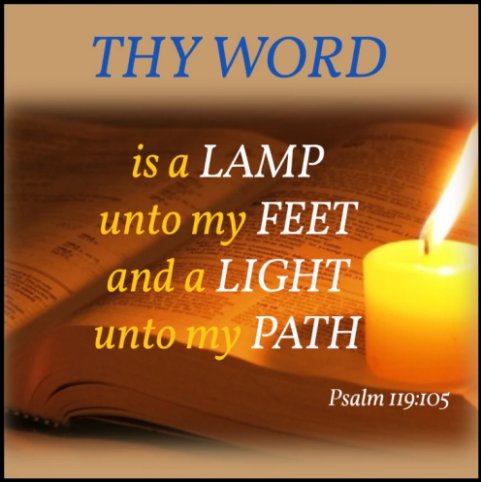
Unacceptable Protestant Justifications
The question then arises - at what date and in what sense did Christians/Messianics start using the term 'Scriptures' for the Christian or New Testament/Messianic writings as we do today? Protestants, primarily, but also others, posit or suggest that "according to the Scriptures" (1 Cor.15:3, NKJV) refers to Christian/Messianic testimony books or early Gospels, since no Tanakh (Old Testament) passage specifies the resurrection on the third day. This assumption and conclusion is not, however, justifiable. There is no question that Paul means the Tanakh (Old Testament) as the groundwork of Christian/Messianic preaching, and probably relates simply the fact of the resurrection and not its occurence on the third day, to prophecy. Even less acceptable is the suggestion that the anarthous en graphéi in 1 Peter 2:6 means 'in writing' (e.g. a hymn) because the passage quoted is from the Tanakh (Old Testament) and not a previously unknown Christian hymn.
Early Collections of Yah'shua's Sayings as Scripture
Nevertheless there were undoubtedly collections of authoritative sayings of Yah'shua (Jesus) in the apostolic community and 1 Timothy 5:18 seems to represent a quotation from such a collection, linked with a Tanakh (Old Testament) citation, the two together being described as 'scripture'. Again, Paul in 1 Corinthians 2:9 cites by gegraptai a passage which, unless it is an extremely free rendering of Iasaih 64:4, is unidentifiable (many of Paul's citations are loosely quoted Tanakh passages). It occurs in various forms elsewhere in early literature, however, and now as Logion #17 of the Gospel of Thomas. It's possible (though unprovable) that Paul is quoting a saying of Yah'shua (Jesus) not recorded in our Gospels (as in Acts 20:35, "It is more blessed to give than to receive" - NKJV) and that he cited it as he would 'scripture'. This leaves open the question as to what the precise boundaries of the canon in fact are and who decided them?
Apostolic Letters as Scripture
If indeed the tradition of the Master's (Lord's) words was so early called 'Scripture' it would be an easy step to so describe apostolic letters read in the Messianic Community (Church); and despite many dogmatic statements made by liberals to the contrary, there would be no reason why this should not have occurred in apostolic times, e.g. 2 Peter 3:16, as usually translated, represents:
"Therefore, beloved, looking forward to these things, be diligent to be found by Him in peace, without spot and blameless; and account that the longsuffering of our Master is salvation -- as also our beloved brother Paul, according to the wisdom given to him, has written to you, as also in all his epistles, speaking in them of these things, in which are some things hard to understand, which untaught and unstable people twist to their own destruction, as they do also the rest of the Scriptures" (2 Pet.3:14-16, NKJV).
The Place of the Protestant Canon
Though this is a perfectly reasonable presupposition and hypothesis, it remains only that, what one theologian (A.E.Willingale) calls "a dark (i.e. unknown) place in New Testament history, though one where we may hope for future light". For this reason, Messianic Evangelicals avoid the unsubstantiated Protestant dogma that the Bible is all the Scripture there is whilst we nonetheless voluntarily limit ourselves to the Protestant canon (the contents of which are regarded as authoriative by nearly all denominations) as primary Scripture for the sake of unity until Messiah returns to personally establish the canons for the Millennium and beyond.
The Authority of Scripture
All authority (toqef) comes from Yahweh-Elohim, our Heavenly Father. But what exactly is meant by the 'authority of Scripture'? Most of the ideas we have about the authority of scripture in the 21st century were hammered out in the debates of the 16th century by Protestants in response to Roman Catholic ideas about the relationship between Tradition and Scripture as well as that church's historical abuses of authority, its false beliefs and false practices. The Reformers appealed to scripture over against the tradition which had grown up in the church during the Middle Ages. Accordingly, like the early church fathers, Protestants correctly accord Scripture the central place in their faith, life and theology. All Christian churches, irrespective of their denomination, affirm that the Bible is both the central way in which Elohim (God) addresses His people and a central way in which the people respond.
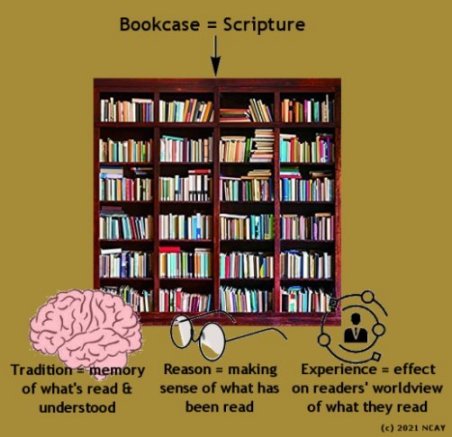 Scripture in relation to tradition, reason and experience
Scripture in relation to tradition, reason and experience
Scripture in Use and Abuse
Reading and studying Scripture has always been seen as central to how believers grow in the ahavah (love) of Yahweh, how they come to understand Yahweh and His emet (truth) more fully and how to develop the moral muscle to live in accordance with the Besorah (Gospel) of Yah'shua the Messiah (Jesus Christ) even when everything seems to be pulling in the opposite direction. The way churches have done this has not, however, been uniform. That is because the way these things are done is influenced, both positively and negatively, by five things that are in constant flux in any generation and serve as lenses through which Scripture is interpreted, causing its application to be modified both positively and negatively, depending on whether they correctly focus the emet (truth) or distort it because of wrongly made assumptions:
The Artificial Privileging of Certain Doctrines
The Bible says things that most people do not want to hear, let alone do, because of cultural pressures, political correctness, current philosophies, theological interpretation and the ethics of the age...and more. This is true of both believers (Christians and Messianics) and unbelievers, of 'liberals' and 'conservatives'. There are things in Scripture which everybody doesn't like or agree with and who therefore try to skirt around, with some even pushing the Bible to one side. In the case of Protestants, for example, parts of Scripture often get pushed aside (usually, but not always, liberals) in order to highlight and privilege a doctrine of justification or personal salvation at the expense of other revealed truths, not realising that their attitudes are not just the result of the Bible per se but also of inherited Enlightenment, romantic, and existentialist attitudes. When they say, 'the Bible says this' what they typically do not realise is that their 'seeing' passes through a very thick distorting lens of historical, cultural, political, philosophical, theological and ethical assumptions. Attitudes toward salvation, hell, sexuality and the Torah (Law) for example, impact the thinking and behaviour of millions of believers, leaving huge theological blind spots and defective lifestyles.
The Simplists, Contextualists, Historicists and More
This is a reason there is so much disagreement between the 'simplists' ("The Bible says..."), the 'contextualists' ("That passage was said in the context of a particular theme"), the 'historicists' ("This word or phrase meant that in the time the passage was written and not what we mean by it today") and the 'dispensationalists' ("That no longer applies to us but was only for then"). At the other extreme are those who want to disprove certain parts of, or teachings in, the Bible because they run counter to their evolutionistic, postmodernist twisting of reality, for whom the Bible then becomes 'unreliable' because they believe morals and ethics 'evolve' over time. Truth, for them, is a moving target, in constant flux, and depends on current social attitudes. Everybody, whether 'conservative' or 'liberal', brings a whole set of presuppositions or assumptions with them - some true and some false - when they read the Bible, much of it useless baggage hampering a true understanding of Scripture.
Yahweh's Authority as Exercsied Through the Scriptures
Messianic Evangelicals are no different from anyone else though we do try to make as few assumptions as possible - the more that are made, the greater the possibility of error creeping in. We make, inevitably (because you cannot avoid it) the overarching assumption that the Bible is inspired and authoritative, which makes us therefore 'conservative' in the broadest sense. But by that we mean that the authority of Scripture is a shorthand for Yahweh's authority exercised through the Scriptures. To understand the Scriptures properly, we assert, requires that we interpret it through the lenses of the original writers by being rigorously historially-minded, reading them in context at all levels (by chapter, book, covenant, etc.), lingusitically accurate, and by being careful to understand the Hebrew mindset (phronema) that Yahweh used to reveal Himself to them...and hence to us also.
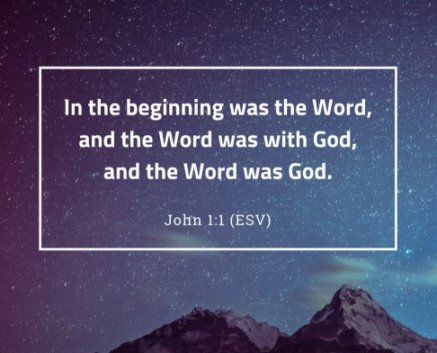
Beyond Rationalism to the Phronema of Scripture
This is not an easy task but a very necessary one if we are to deal honestly with Scripture on its own terms and not our own. That is not so say that new light and truth cannot come forth through the Scriptures in every generation because it does, or that fresh revelation cannot be received to amplify and clarify, but it does mean the assumptions made by every generation have to be carefully examined and at times challenged. Even in making this statement we admit that we are speaking, to some extent, out of a rationalist, Enlightenment-type mindset, which is a relatively new theological tool historically-speaking. Accordingly we have to do far more than employ the intellect: we also have to discern what in the first centuries was called the phronema too, which is the collective mind, heart and spirit of the original messianic community (church) - its faith, obedience and compassionate humanism...its 'soul', if you like, and try to as closely reflect its original 'spirit'. Though itself waylaid by much false tradition, this is something the Eastern Orthodox Church (and to a lesser extent, the Catholic Church) has consciously sought to do, giving it continuity, even if it has arisen out of many evolving assumptions that cannot be verified either scripturally or historically (e.g. its views on the Trinity, Virgin Mary, veneration of relics, etc.).
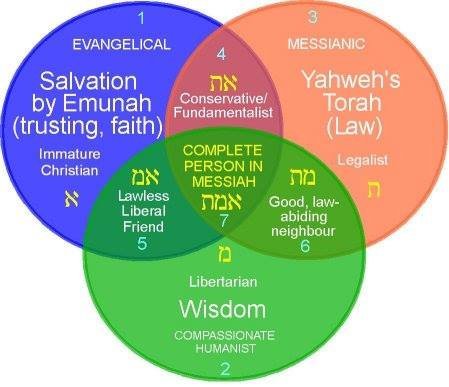 Scripture teaches a threefold balance in the regenerated nature of the saved; only when this is in place can the Bible be properly interpreted
Scripture teaches a threefold balance in the regenerated nature of the saved; only when this is in place can the Bible be properly interpreted
Realities and Difficult Questions
The continuing exploration of the Scriptures is an ongoing exploration of the emet (truth) about the character of Elohim (God), the full extent of the Besorah (Gospel) of Yah'shua the Messiah (Jesus Christ), the glory of the Universe and of man's uniquely designed place and purpose in it. NCAY has arrived at a unique time in history, when a dangerous imbalance leading to a fracturing of the integrity of the soul has been reached between the spirit, mind, heart, and physical world, that has led to the rapid decline and fall Western civilisation. What will replace it in the final years of the current dispensation? How should the Scriptures be employed in a post-Western and neo-pagan postmodernist world that rejects the rational mind in favour of subjectivity and existentialism? Is even the present world, which has chosen not to be saved, recoverable? Should believers attempt to save a sinking ship or transfer to a new one? And what rôle should the Scriptures play in this changeover?
Western and Eastern Christianity
Western Roman Christianity, and its Protestant spawn, is dying, and a historical cycle is repeating itself. As anciently the Western Roman Empire collapsed, so the Eastern Roman Empire assumed its mantle for a while before itself being overwhelmed.
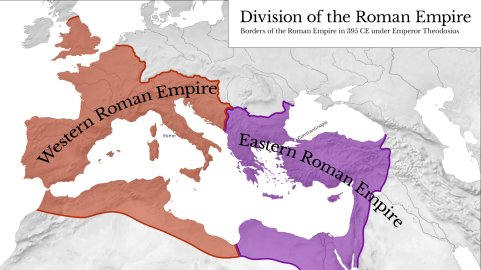
In our day we are witnessing a transfer of authority (and credibility) from the West Roman Church (Catholicism and its Protestant offspring) and the way it 'does Scripture' to the East Roman Church (the Eastern Orthodox Church) and the way it 'does Scripture'. Both, however, are 'Rome' and both have made compromises - sometimes major ones - with paganism. Many, disillusioned with the Western Church, will turn eastwards to the Orthodox Church for a time before it, like its Byzantine forebearer, collapses into the dust.
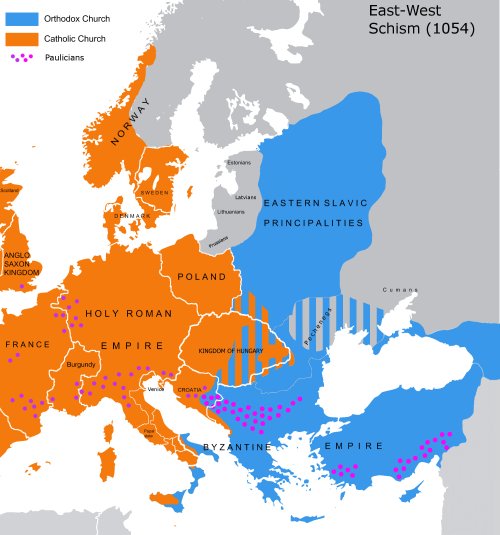
New Ways of 'Doing Scripture'
This Scripture subsite presents a new way of 'doing Scripture'. We acknowledge that there is much to be learned from the scriptural work of both Western and Eastern Christianity that should be retained, and most importantly the Western Reformation. However, the current models, which are almost ubiquitously Torahless, cannot sustain or prepare the Remnant for its final task of the Last Exodus which requires a unique vision and spiritual empowerment both to survive and prosper in the stormy era of tribulations and judgments provoked by global idolatry. To accomplish this and to so equip the end-time qodeshim (saints, set-apart ones), the Scriptures have to be viewed not only with ancient Hebrew (and to a lesser extent, ancient Greek) lenses but with fresh 21st century ones too fashioned in a matrix of authentic revelation. However, to accomplish this, the Remnant theologians must first unpack and fully expose the doctrinal clutter of the centuries so that none are tempted to return to stagnant ponds, something this website began tackling in the late 1980's and has been doing ever since.
Ways of Thinking That Must Die
Many fashionable and hugely popular, entrenched golden-calf ways of thinking, believing and behaving in both conservative and liberal wings Protestantism and Messianism must die:
- 1. Dualistic 'rapturism' fantasies;
- 2. The anti-spiritual, materialist health-and-wealth or 'Prosperity Gospel';
- 3. Pagan 'tongues' (gibberish);
- 4. Racist 'Black Israelite', 'WASP' (White Anglo-Saxon Protestant) and 'Jews-first' thinking;
- 5. Nationalist and religious syncretism, e.g. modern American & Chinese supremacism;
- 6. Anti-Torah, -commandment and -holiness attitudes, e.g. conservative hyper-grace Calvinism and 'anything goes' liberalism;
- 7. Zionism and the illustion biblical Israel was restored in the Middle East in the late 1940's;
- 8. Legalism and Gnosticism - the attempt to be saved by 'works' or 'knowledge';
- 9. Modernist claims to 'objectivity' through 'neutral' reading of Scripture (an impossibility);
- 10. Compromises with atheistic evolutionism in Science;
- 11. Postmodernist 'cultural relativism', e.g. 'the Old Testament cannot be taken seriously';
- 12. Rationalist rewriting of history and 'Enlightenment' anti-Christian generalisations and over-simplifications;
- 13. Justification of denominationalism as a more-or-less permanent 'solution' to theological disagreement and schism;
- 14. Sexual immorality and anarchy including monogamy-onlyism;
- 15. 'Kingdom Now' (usshering in the Millennium through political influence and control, e.g. 'Neo-Conservatism') and 'Liberation' (violent Marxist revolutionary action) theology;
- 16. Mediæval thinking about hell, eternal punishment, annihilationism and the afterlife in general;
...and much more besides (see Lev's Hot Potatoes for an overview).
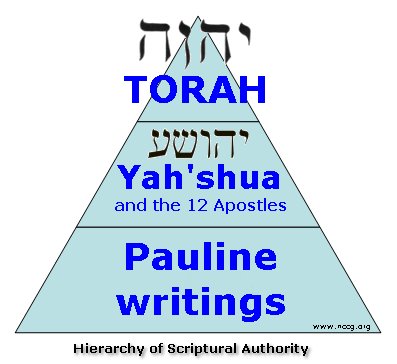
Conclusion
On this subsite, and on the website as a whole, we shall be looking at many aspects of these highly treasured writings and how they have been misread and twisted over the centuries. This is not, as previously stated, only a mental or intellectual exercise but has to both have historical precedence and be backed up by authentic spiritual, life-changing power in our own day. The Scriptures are a springboard to an authentic chayim (life) and life-style in Christ otherwise claims to be 'led by the Spirit' will continue to be meaningless in vast swathes of Christendom. They are not the intellectual's playground and are therefore not the object or goal in and of themselves. They are a means to an end, a tool of the Eternal Davar (Word), Yah'shua the Messiah (Jesus Christ). Approaching them with the right balance becomes, therefore, all the more urgent.
(22 June 2021)
 CBS030
CBS030

|


